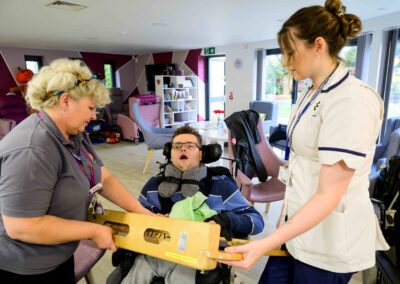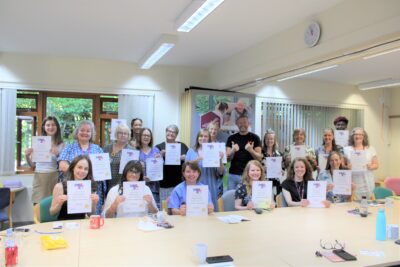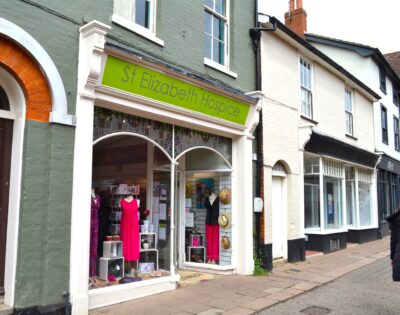“The hospice means the world to us”
Continuing with the Hospice Care week theme of ‘Connecting Care’ we look in to St Elizabeth Hospice’s day care and the Monday drop-in service. This is designed to help maintain connections with those patients who no longer need constant hospice support.
Since benefitting from a total refurbishment in November 2014, the new and welcoming, state-of-the-art day centre at St Elizabeth hospice was officially opened by HRH The Duchess of Gloucester in June this year. This spacious, airy atrium now plays host to a variety of bespoke services, accommodating a wider range of activities than was previously available.
Service development manager, Julie Harris said: “Being part of a community with people having a shared experience is often what enhances well-being.
“We know people feel safe here and they want to remain connected even if they no longer require specialist services – and we welcome anyone who wishes to return and visit us.”
In January 2015, the new drop in service was launched in the day care atrium, catering for those patients who want more casual access to services but also wish to ‘remain connected.’
The drop in service means the world to us
For mother and daughter duo, Ivy Jones and Karen Strike, the drop-in service at St Elizabeth Hospice, is essential.
Ivy said: “It means the world to us, as apart from family and carers, we don’t get a chance to be with other people.
“The weekly drop-in at the hospice means that we can extend our social circle. We both love to talk, so often new patients are introduced to us by the staff as they know we will make them feel welcome.”
Both mother and daughter enjoy working on the various craft opportunities available to them whilst attending the hospice’s drop-in service. Ivy said: “I really liked making the rose buttonholes. There are always interesting activities arranged for us here.”
Both mother and daughter are incredibly creative in their writing and art. With three published poems to her name, Ivy is a prolific writer, and is currently working on an illustrated children’s book, as well as more poetry, crochet, cards and Christmas decorations.
Her daughter commented: “Mum is always doing; she can create things out of thin air.”
We all know how lucky we are to have a place like this
Ivy, 75, was diagnosed with Myatonic dystrophia in 1990, an inherited progressive muscle- wasting condition. She was the first member of her family to receive a diagnosis. In her case, it was first noticed when her jaw which stopped working properly.
She now cannot eat, drink or swallow and has recently had a feed-peg fitted, along with a pacemaker. She has also just had major eye-surgery to remove cataracts and correct a problem in her right eye. These are all areas commonly affected by the condition, although there are wide variations even amongst members of the same family.
Karen, 52, was diagnosed seven years ago aged 45, when the condition began to affect her hands just two years into an Art degree course at Colchester Institute.
She explained: “I had to give it up, just when I had got all my materials together. I have so much stuff that I now can’t use. They are all in boxes stored away. I would like to build a summerhouse to have as my studio so that I can see all my things.”
Karen was referred by the Lung Function ward at Ipswich hospital to St Elizabeth Hospice about four years’ ago and has been coming ever since.
She enthuses: “The’ meeters and greeters’ who welcome new patients into the hospice really do work. They completely put people at ease. We all know how lucky we are to come to a place like this.”
This place is so much more about living
Both ladies have benefitted from and contributed to a range of services provided by the hospice over the years. Both have been regular visitors to day care and the drop-in service, had physiotherapy and spent some time on the inpatient unit for respite care.
Ivy first contacted St Elizabeth Hospice through the One Call service in June 2012. It did not take long for her to be referred for assessment to day services where she began to regularly visit day care as an outpatient.
She loves meeting up with new and old friends on her visits and explained how these days help her to get out, supplementing the visits she receives from her hospice companion who visits her at home as part of the Befriending scheme.
Ivy has also been looked after on the 18 bed inpatient unit on three occasions as part of respite care for her and her husband of 63 years, Barry.
“He has been my sole carer, getting up at 6am to give me my medicines before using the early morning in which to tend the garden.
“He has now been diagnosed with oesophageal cancer, so I have a live-in carer.
“Barry needs to let go and let others help. I would love him to spend some time in the hospice with me and be cared for as Karen and I are.”
Karen agrees as she says: “This place is not about dying but so much more about living and we need to communicate this to people.”
Giving back
Despite being cared for in so many different ways at St Elizabeth Hospice, it has not all been one-way support. Ivy and Karen have both found a variety of ways to give back to those who have helped them. Ivy has participated in the Larch Project three times now; a ground-breaking schools’ project designed to tackle taboos around death.
She also got involved with the creation of ‘The Miracle of the Roses’ sculpture which is displayed in the day centre entrance.
Both mother and daughter are keen on helping to develop new groups and get involved with any creative writing and art-based projects the hospice runs.
It’s a gift
Karen explains her deep-rooted feelings for St Elizabeth Hospice:
“I feel passionate about this place and all that is done for us patients through the opportunities and facilities provided. We are able to do so many things with that support.
“We really know what the hospice does and how essential it is.”
Karen recalls a time when she turned to St Elizabeth hospice for help when her daughter, Laura, had just given birth to her son in Sunderland.
“It’s one stand-out thing that I shall always remember that the hospice did for me.
“My daughter had just had our first grandchild and I was desperate to go up to see them. Social Services could have funded special accommodation up there but I had to organise it myself. I didn’t know where to start.
“As I was explaining my dilemma in day care, one of the healthcare assistants, Ann, overheard me and said she could help. After several phone calls she had it all arranged.”
She had got in touch with a hospice in Sunderland who found a care home with a high dependency unit which would accommodate Karen’s needs. Karen was given a bed for a fortnight, enabling her to see her grandson, Ethan, at two weeks old and be there to support her daughter.
“What a gift! They’ magicked’ it up for me and made it comfortable and safe.
“We need a National Health Service like this, where care can be connected to enable patients to get about, as it not always possible for friends and relatives to visit us.”
You begin to learn how lucky you are
Like her mother, Karen has also had the need for respite care in the inpatient unit, she laughs at the memory of having really bad toothache whilst she was there:
“It was the right place to be as they had enough painkillers to help me cope with it.”
She remembers having signs of her condition as a child but always thinking that it was just normal for her family.
“My uncle and two cousins have Myatonic Dystrophia as well, as did my grandmother, although she was never diagnosed with it.
“There’s a lot of role-reversal in our family with us all caring for each other but this is a place where we feel safe.
“You begin to learn how lucky you are, being here. I feel honoured to know the people I have met at the hospice, people who never moan and never complain.”
You can find out more about St Elizabeth Hospice and all its services here



